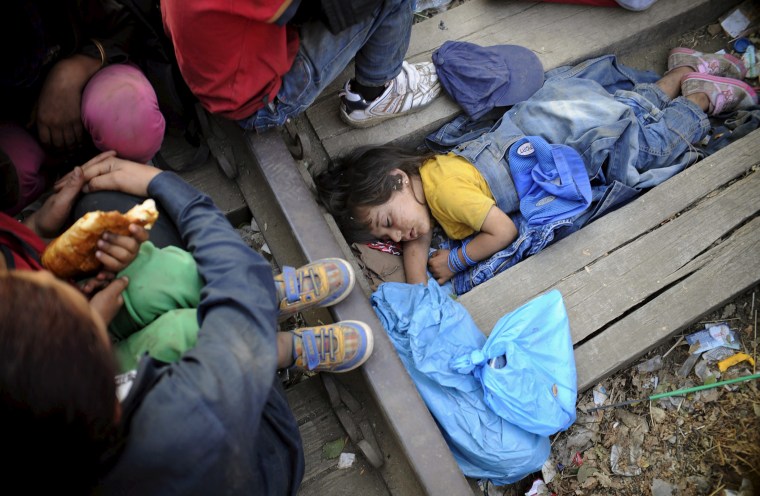For every single image of a child refugee that breaks through the noise, there are millions — 28 million in all, according to UNICEF — who have been forcibly displaced because of violence and insecurity. On the heels of a new report on the global child refugee crisis and two United Nations General Assembly summits on the topic, NBC News spoke to UNICEF deputy executive director Justin Forsyth. The interview has been lightly edited for clarity.
What would you like Americans to know about what you’ve seen of the child refugee crisis on the ground?
I’ve just got back, earlier in the summer, from a trip to the Mediterranean, off the Italian coast on an Italian Coast Guard ship. They were pulling many migrants and refugees out of the seas every day … One girl had escaped Boko Haram and was being trafficked into prostitution by gangs in Italy. She escaped and got on a boat, which sank, and now she was in a children’s hospital in Sicily. Even though the story was tragic, she also had this huge hope for the future about getting an education.
Whether it’s those children [on the Mediterranean passage] or the ones fleeing gang violence in Central America, children are children and we need to respond by helping them as if they were our own children.

The UN summit was the beginning of a process and not the end, and was particularly on migrants, not just refugees. It did make some commitments on education — that children on the move need to not have their schooling broken. And it made commitments on not detaining children. But it was mainly about getting everyone to agree on the scale of the process and scaling out a two-year process. President Obama’s summit was much more concrete. A half-billion dollars was committed from the private sector, as well as countries increasing their commitments [to taking refugees] and to education.
President Obama also announced that the United States would increase the number of refugees it will absorb to 110,000 — a 60 percent increase over last year. Your report, Uprooted, says there are 31 million displaced children. Is the United States doing enough?
It’s a big step up and it’s important. But the numbers are huge. A country like Lebanon has taken a million refugees. Some of the poorer countries in the world and countries like Ethiopia or the Democratic Republic of Congo take even more. Some of the poorest countries in the world shoulder the biggest burden …. But we applaud President Obama’s leadership in terms of galvanizing the world to act.
Are you concerned that we’re experiencing a backlash against taking more refugees?
No one would disagree that we need orderly and controlled migration. No one, or at least very few people, thinks we should open all borders. But we all have international commitments. We can’t let the poorest countries [do it all].
We think Britain could do much more in taking unaccompanied children. It has a proud history of taking Jewish children during World War II. When the United States took a lot of these lost boys from Sudan, many of those children went on to be doctors and successful people in their community and made a big contribution to their communities. I think we have to, as President Obama said, not look at refugees as a problem but also as an opportunity.
Donald Trump Jr., the son of the Republican presidential candidate and an adviser to his campaign, recently tweeted a meme that said, “If I had a bowl of skittles and I told you just three would kill you. Would you take a handful? That’s our Syrian refugee problem.” What’s your reaction to that message?
I think as a humanitarian organizer, I don’t want to get involved in the American election. Much more widely than any particular campaign, we all have an obligation to be careful about the language we use. There’s a rise in Europe of xenophobia and racism …. All politicians have a responsibility of a making sure they don’t fuel or fan any negative response to refugees.
You point out in your report on displaced children that images — like those of Alan Kurdi and Omran Daqneesh — “command the world’s attention and invoke its compassion. But only one image, one child at a time. The moment passes — the news cycles move on. But the danger and desperation that drive so many children and families to flee their homes are not moving on.” What impact do these images have?
We need to act regardless of just having the images. Obviously those tragic images really do make everyone think. It moves all of us. I’ve got a little boy of about the same age. It immediately makes you think of your own children .… I remember many people ringing up [after the image of Alan Kurdi] and asking how they can give money. But it does pass.
… There’s all these big numbers. We have them in our report: 50 million people uprooted. In the end, we have to tell the stories of the children refugees, their heroism, both the tragedies of what happens to them and their commitment to a better life, and tell the stories of the people who help them — these are the modern day heroes. We need to tell these stories of humanity.